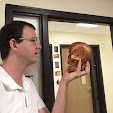Wednesday, November 18, 2009
Spinnuzi, Chapter 4
Monday, November 2, 2009
Burton, Chapter 3
I might've gotten a little carried away. I've created topic headings so you might more easily find what you think's the most interesting section below to read:
--(Quantitative research on daily lives) This is such an interesting chapters to read for methods and claims about methods for variety of reasons. We can talk about Burton's methods or her presentation of Wesley's methods for "the care of our time" (72). Burton speaks to the connection of Wesley's time with the Holy Club when he was at college and their "methods" of accounting for one's use of time and and engagement with productive, reflective, or spiritual activity. Given the interest some of us have in more quantitative methods, Wesley's notation system for coding different activities throughout a day invites me to think about the ways we, as researchers, might collect such data today (quantified data about a person's daily life) and what activities our inquiry might be geared toward. The frequency and length of texts and tweets over a given day? Emails? What are the varieties of daily practices in which folks engage and what level of "care" do they bring to them?
--(Conforming/Transforming work of journals) When Burton notes the way life at Oxford is structured to generate a desire on the part of its students to maintain and normalize the sense of privilege they experience in that ivory tower (77), the spiritual and literate disciplines of journaling articulated by Wesley suggest a means of both social/personal control and transformation. While journaling might be read as a way for subjects to confess and make themselves into a Foucaultian docile subject, in the context of privilege it can be a way of calling into question the "natural," the given of life at Oxford. Inviting individuals and communities to write the details of their lives might enable them, through increased awareness, to intervene against their own complicity with oppressive structures or to enhance the exercises of agency Cushman so urges us to be cognizant of.
--(History-laden nature of literacy events) Burton's account of Wesley's "conversion" or "conviction" experience at Aldersgate situates his increase in spiritual life and power in a multi-layered literacy event connected to a long tradition of church history. While among the Moravians, Wesley's hearing of someone read aloud Luther's writings about the book of Romans leads him to write, "I felt my heart strangely warmed" (83). So, to break this literacy event down, we've got Wesley hearing a worship leader read aloud (a worship practice he got used to with his mother, Susanna) an exegesis from a 16th century Reformation instigator, composed in response to a 1st century letter written by St. Paul to an audience of Roman Christians. To recap, that's an oral rendering of a commentary on a letter, each centuries removed from the other. Such rich, historically laden literacy events (the trope of increased conviction upon hearing another's reading of Scripture) have a long tradition in western Christianity. For example, St. Augustine found himself led to a conversion experience during a sermon by St. Ambrose. Augustine was first taken in by the pleasantness of the rhetoric and then began to realize the truth that was being communicated. Having this sense of ecclesiastical (or church) history in mind I think realizes one fascinating dimension of the method Burton deploys for those interested in the history of sacred rhetoric in particular. The attentiveness to the specifics of the literacy event reveal the situational, contextual, and deeply rhetorical nature of communication about the divine. Often, speaking subjects (especially historical and orthodox figures) who voice their spiritual understandings are not thought to be engaged in what we in rhet/comp might see as 'good' rhetoric or rhetoric that is aware of its embeddedness in culture. They are often seen as adopting a kind of Boothian conquest rhetoric--win at all costs. However, Burton's rendering of Wesley's experience (and my supplementing of it here with Augustine's) indicate the necessarily shifting and radically specific nature of communication about the eternal and the divine.
--(History and ethics) One of the conversations that emerged post-colloquium in our class last week was a seeming difference between the kinds of ethical commitments owed by historical researchers to their subjects and those owed by ethnographers to their participants. There are a few ways in which Burton troubles this distinction. She sees her subjects as vivid and vibrant actors in social life and tries to give readers a sense of their rich lives, allowing us to see how diaries and journals worked to order the personal and spiritual lives of Wesley and early Methodists. At the beginning of the chapter, she turns to work of Ralph Cintron for a frame that allows her speak about the function of the journals in ordering the symbolic lives of their writers. What do we make of this link between an ethnographic frame and a historical inquiry?
